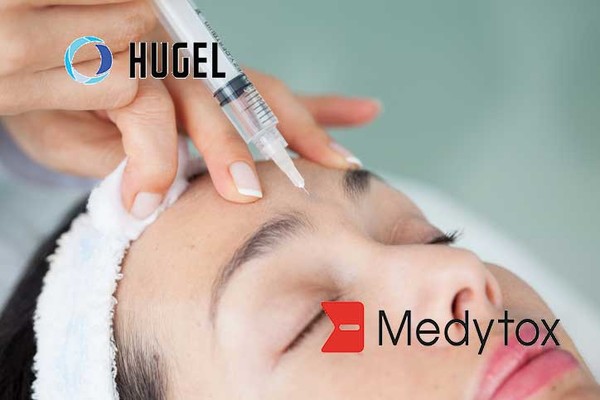Hugel announced it secured a decisive victory in its long-standing legal battle against Medytox at the U.S. International Trade Commission (ITC) on Thursday (local time), paving the way for the company's expansion in the lucrative U.S. botulinum toxin (BTX) market.

The ITC's final ruling upheld its earlier preliminary decision from June, which found no violation of Section 337 of the Tariff Act, a law that restricts the import of goods infringing on intellectual property rights.
The commission rejected Medytox's claims that Hugel had stolen botulinum toxin strains and related manufacturing processes, determining that there was no basis for these allegations.
The ITC’s final ruling marks the end of a legal battle lasting over two years between the two Korean BTX makers.
This ruling significantly strengthens Hugel's position as it seeks to expand in the U.S., which accounts for more than 60 percent of the global BTX market.
Hugel has already made strides in the U.S., receiving FDA approval for Letybo, its BTX product in March of this year and shipping its first batch to the market in July. The company aims to capture a 10 percent market share in the U.S. over the next three years.
This legal victory, combined with its regulatory success, makes Hugel the only Korean BTX maker to have secured product approvals in three key markets: the U.S., Europe, and China.
Hugel expressed its satisfaction with the outcome.
“With the ITC’s final determination confirming that the accusations of botulinum strain theft were baseless, uncertainties surrounding Hugel’s U.S. business have been resolved,” a Hugel official said. “We will continue to enhance corporate trust and shareholder value while pursuing growth in the U.S. and other global markets.”
In response to the ITC’s final ruling in favor of Hugel, Medytox expressed deep disappointment with the decision and vowed to take further action to protect its intellectual property.
“We believe the decision made by the full commission is deeply flawed,” a Medytox official said. “We will review our options and take all necessary measures to continue fighting for the truth.”
The official also reaffirmed its commitment to pursuing legal avenues to defend its proprietary technology.
The ITC decision also had a notable impact on the stock market, with contrasting outcomes for the two companies involved.
Hugel’s stock surged as investors responded positively to the favorable ruling, viewing it as a significant win that clears the path for the company's expansion in the lucrative U.S. botulinum toxin market.
As of market open on Friday, Hugel’s shares stood at 268,000 won ($198), up 10.54 percent from the previous trading day.
In contrast, Medytox’s shares dropped to 178,000 won, down 4.3 percent from the previous trading day.
History of the case
The legal battle between Medytox and Hugel began in March 2022, when Medytox accused Hugel of stealing its proprietary botulinum toxin strains and manufacturing processes.
Medytox filed a complaint with the U.S. International Trade Commission (ITC) against Hugel, its U.S. subsidiary Hugel America, and its U.S. distribution partner, Chroma Pharma. In May 2022, the ITC accepted Medytox's complaint, initiating the investigation.
Medytox claimed that Hugel’s explanation of how it obtained its Clostridium botulinum strain lacked credibility, asserting that the strain had been stolen in 2001 from Medytox CEO Jung Hyun-ho, who was then a university professor and botulinum toxin developer. Medytox further alleged that Hugel’s claim of discovering a new strain of C. botulinum from a food source in Korea in 2002 was dubious, given that no cases of botulinum toxin development from food sources in Korea had been reported before 2003.
During the discovery process, Hugel submitted evidence in its defense, and Medytox reviewed this documentation. However, in September and October 2023, Medytox withdrew its claims regarding trade secret misappropriation of the botulinum strain. This was followed by the withdrawal of allegations related to Hugel’s manufacturing process in January 2024, effectively weakening Medytox’s case.
In the midst of these developments, Hugel made strategic moves to strengthen its position in the U.S. market.
In July, Hugel finalized a strategic partnership with Benev, a California-based medical aesthetics company, to distribute its botulinum toxin product Letybo in the U.S.
While some industry observers expected Hugel to pursue direct sales in the U.S., given its prior partnership with Chroma Pharma and the establishment of Hugel America in 2018, the company opted for a collaborative sales approach.
Related articles
- Higher court rules against MFDS' revocation of Medytox’s BTX license
- Hugel ships 1st batch of BTX Letybo to US
- Hugel partners with BENEV to enter US with botulinum toxin Letybo
- US ITC rules in favor of Hugel in dispute with Medytox over origin of BTX
- Hugel introduces method of using HA fillers at Japanese aesthetic society
- Medytox Q3 operating profit up 68%, driven by hyaluronic acid filler sales
- Hugel expands BTX presence in MENA region through strategic partnership with Medica group
- Medytox appeals ITC ruling in favor of Hugel over BTX dispute
- [JPM2025] Hugel considers PLA and collagen injections as part of M&A strategy
- Hugel secures regulatory approval for BTX in UAE

